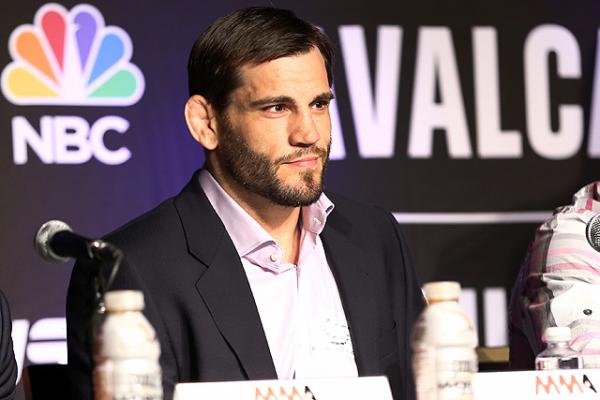Before you read anything further here, click on over to Sports Illustrated’s website for an insightful and reader-friendly breakdown of the class-action lawsuit filed against the UFC on Tuesday. Propers to Michael McCann for his analysis.
Assuming you’ve done the reading and/or have been following the latest in MMA news, you know that at least three fighters have taken official legal action in an effort to establish that the world’s leading mixed martial arts promotion has created an unfair monopoly by acquiring and dissolving its competition while simultaneously structuring fighter contracts in terms that seem to be disproportionately balanced in the company’s favor. The plaintiffs seek two things: 1.) money from the UFC and 2.) a court-issued injunction preventing the company from continuing to engage in what the suit refers to as the “anticompetitive scheme” detailed in the filing, one the plaintiffs claim violates Section 2 of the Sherman Anti-Trust Act, which forbids companies from engaging in practices meant to establish or further a monopoly in a particular industry/market.
The general consensus, summed up excellently by McCann, is that while that second part of the claim would be earth-shattering for the UFC, the company has a litany of likely defenses it will present in response to the suit and that victory for the plaintiffs is far from assured. They must, in essence, prove that the UFC has intentionally manipulated the MMA marketplace to further its own position as the industry leader and then used that position to systematically suppress fighter wages. Certainly not a slam dunk, especially considering the presence of at least one other promotion with a deep-pocketed backer (Bellator) who has written some hefty paychecks to fighters with whom the UFC had previously parted ways.
If this lawsuit is somehow successful and makes its way through the appeals process, the UFC will, indeed, need to alter many of the ways it does business. But what if the suit fails? What if Zuffa’s inevitable motion to dismiss is granted, and the whole claim dies before it can even begin to be heard in court? Such a result would only embolden the UFC to continue the sort of cutthroat business dealings in which it has allegedly engaged. In other words, business continues as usual.
While it certainly takes courage to stand up to a large, powerful company in the face of a whole lot of criticism — “If you’re not happy with your paycheck, get a different job.” — the fighters in this suit are leaving their fates in the hands of lawyers and judges, which inherently weakens the plaintiffs’ ability to get what they want. If their efforts are all for naught, then, where does that leave them?
Appreciating that Tuesday’s lawsuit represents the most significant effort to date to balance the scales of power in professional MMA, there’s really only one way that fighters might be able to change how things are run: They have to band together and refuse to compete until the UFC’s product is so badly damaged that the company has no choice but to negotiate. Posing a significant threat to the UFC’s bottom line — and threatening to essentially remove the promotion from air due to the lack of a roster would certainly accomplish that — is the only way those inside the Octagon will be able to move those outside of it to action.
This all sounds fine in theory, but there is at least one gigantic barrier to achieving this sort of collective action from the UFC’s fighters. Namely, there would need to be a critical mass not just of the company’s under- and mid-card talent, but also enough of its significant draws (your Jon Jones, Ronda Rousey, Cain Velasquez types) that the company would simply be unable to put together any marketable events. This is extremely unlikely to happen, because the UFC has smartly kept these superstar fighters well compensated. Why, then, would any of these fighters risk their own financial futures just to help out the men and women who appear far below them on the UFC’s metaphorical marquee? (The answer, of course, lies in the the idealistic notion of bettering the working conditions for those in the lower tax brackets, but who has time for that?) As long as the UFC can continue to promote shows that fight fans want to watch, nothing will change, and the absence of the company’s biggest names would be the only way that stops. It’s not like fans (myself included) are going to voluntarily stop watching en masse until the contract structure of the UFC’s talent changes, so effecting such change would be incumbent upon the fighters themselves forcing fans to not watch through outright refusal to compete.
The UFC is a business, and as such is interested primarily in expanding its profits. Fighter pay, as an expense necessary to run an MMA promotion, eats into that profit, so of course the UFC is going to try to keep this labor cost as low as possible. While the lawsuit filed Tuesday will likely shine some additional light onto the way the company treats its fighters and perhaps shift public opinion slightly in the process, total success for the plaintiffs is anything but guaranteed. Until the UFC’s biggest stars join the rest of the roster in solidarity to force change through the threat of ruining the UFC’s ambitious event schedule, the company will continue to have the significant upper hand.

